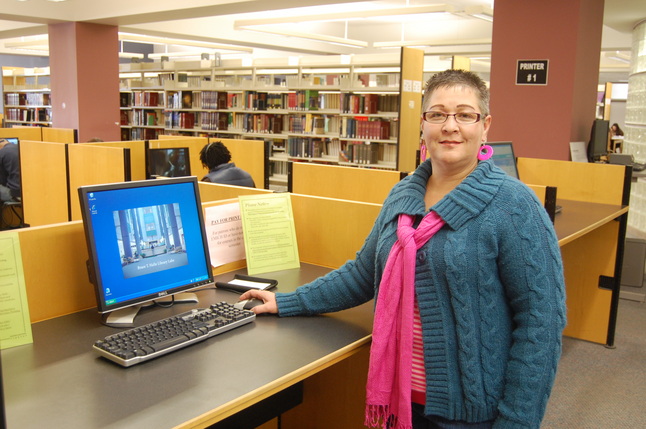50-year-old finds college to be great therapy for short-term memory loss

Valerie Eby, a 50-year-old mother of 10, is working on earning a bachelor's degree in history at Eastern Michigan University.
Janet Miller | AnnArbor.com
But that was not all the 50-year-old mother of 10 girls was doing.
With four children still living at home, Eby would rise early to supervise breakfast and lunch making before dropping the grandson she babysits a few nights a week off at preschool. Then she would make the 40-minute drive from her home in Maybee to EMU’s campus in Ypsilanti, where takes a full-time schedule of classes. “Sometimes I live a whole life even before I get to school,” said Eby, a history major.
It was Eby’s doctor who urged her to go back to college.
In 1989, Eby began suffering from severe migraine headaches. A few years later, she suffered a head injury when a tree branch hit her. Since then, her short-term memory has been impaired. For instance, a church member would call her as part of a prayer chain; Eby would hang up and immediately forget to make a call to continue the chain. “Five days later, I would remember,” she said. “The information goes in but it can take days for me to remember it.”
She began thinking about returning to college when her youngest child entered kindergarten. But it was her doctor’s suggestion that she take a class as a way to improve her memory that eventually motivated her to return. She enrolled at Monroe Community College, a school she had attended 30 years before.
Despite getting only six and a half hours of sleep a night, chauffeuring kids from basketball practice to appointments, and sometimes rising at 3 a.m. to work on a term paper, the hardest part of returning to school after three decades, she said, has been the guilt she feels from not being a stay-at-home mom to her youngest daughters. “I’m not as available for the younger kids as I was for the older kids,” Eby said.
Six of her daughters are adults and the four others range in age from 6 to 13.
Ever since she saw the 1968 movie “Yours, Mine and Ours,” which tells the story of a couple with 18 children between them, Eby has wanted a large family. “I didn’t make it to 18, but I got very close to a dozen,” said Eby, who is one of six siblings herself.
Two months out of high school, Eby married the only person she had ever dated. After a year at Monroe Community College, she dropped out to have her first child. Seven years later, she was a mother of five.
“I was at the top of my class and a lot of people were very disappointed that I didn’t go on to college and become someone other than a stay-at-home mom,” Eby said. “But that’s what I wanted. I wouldn’t change anything.”
When their fifth daughter was 7 years old, Valerie and her husband Tom, a tool and die maker, began thinking about adopting more children. “I was so enjoying the accomplishments of my kids,” Valerie Eby said. “They were in 4H and I taught them to sew and knit. I was starting to see the rewards of that. They were all healthy. Two were valedictorians and the other three were in the top 10 of their class. I wanted to give back.”
Shortly after, the couple adopted their first child with special needs. But it didn’t end there. “When you adopt one, you see there are so many. There’s always another one to adopt,” Eby said. She and her husband eventually adopted five girls with special needs, bringing their brood to 10.
When she re-enrolled at Monroe Community College in 2010, Eby noticed a lot had changed.
“I was technologically illiterate,” she said. “I knew how to write a letter on the computer, but that was about it.”
She also had to figure out ways to compensate for her short-term memory problem. She would record the class lectures and listen to them a second time at night. She would write a synopsis of what she had read, then read some more and write another synopsis. “It took me hours and hours and hours,” she said.
Her note-taking skills slowly improved, and so did her memory. She transferred to EMU in the fall of 2011 and is on a partial scholarship. Quizzes that are given before she has had a chance to reread and process the material are a problem for her, she said.
But that hasn’t stopped her from earning top grades. She has a 3.89 GPA, she said, and hopes to graduate with a bachelor’s degree in the spring of 2014. She wants to continue on to earn a master’s degree, so she can achieve her goal of teaching history at the community college level.


Comments
alan
Mon, Dec 24, 2012 : 4:17 p.m.
Maybe I'm overly sensitive but is this story here because she's 50? 50 is not old, incompetent, or stupid. In fact, it usually means motivated. Advice to Valerie: Don't plan on teaching history. The supply of new history Ph.D.'s far exceeds the dwindling demand. A community college won't hire you with a master's because they will hire a Ph.D. who can't find a tenure track position.
Dog Guy
Mon, Dec 24, 2012 : 3:28 p.m.
Those very busy people always seem to have more time than the rest of us.